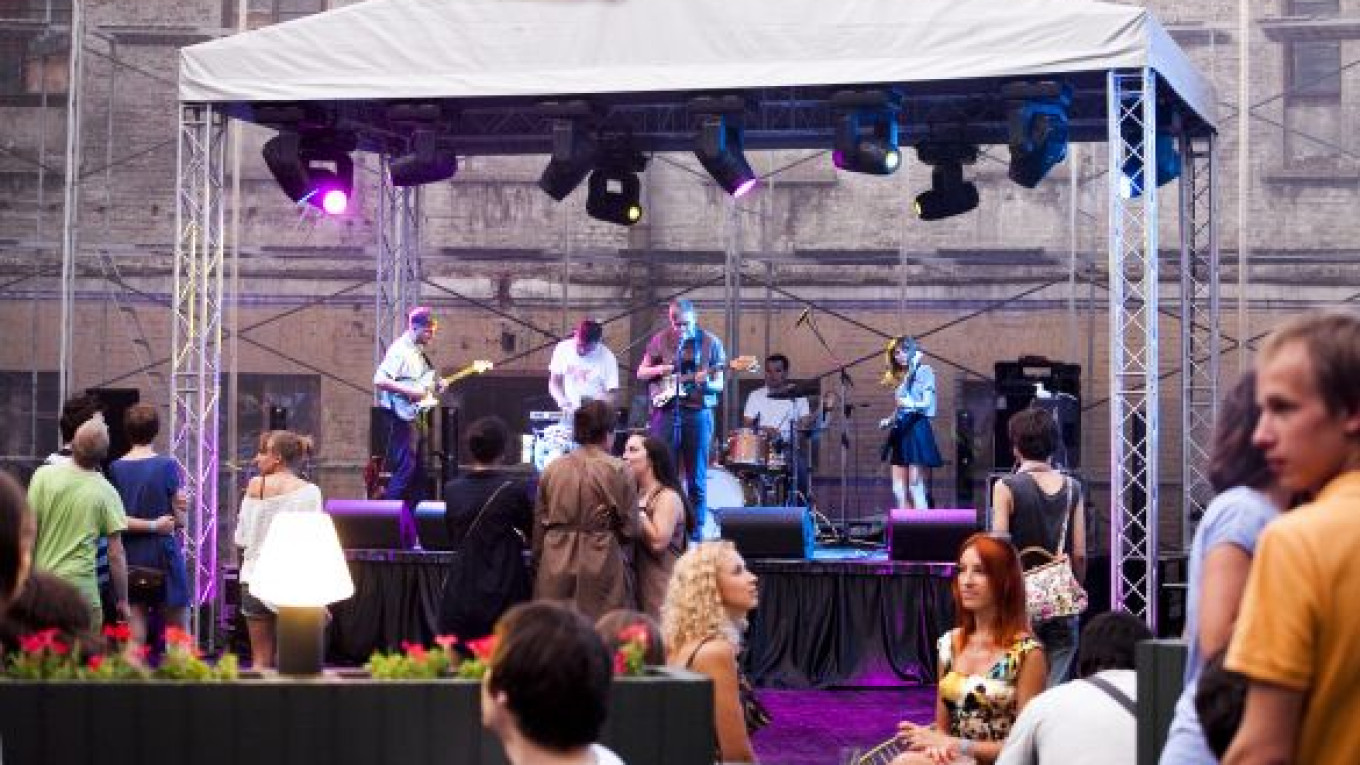ST. PETERSBURG — A little more than a month ago, New Holland Island was opened to the public for the first time in the history of St. Petersburg. Since then, it has become the hippest summer hangout for both locals and tourists. ?
“It’s nice to sunbathe on the grass and contemplate the old buildings of New Holland,” said one recent visitor to the island, Tatyana Ivanova, 28.
The island has been seen by 79,696 people, according to New Holland’s press service, since opening on July 16. They come to play football, volleyball and petanque, to see the exhibit of contemporary artwork, attend open-air movie screenings and inspect the vegetable garden and food stall.
“The first thing I did after arriving in St. Petersburg was to rush to New Holland Island,” wrote one Muscovite on an Internet forum devoted to the island. “I’ve read a lot about the potential of this island, so I wanted to see it for myself.”
“It’s a great idea to breathe new life into an old historic and cultural object,” wrote another visitor from the capital. “Moscow has already witnessed similar projects. … Now St. Petersburg will have its own art space that will fascinate creative people and encourage the development of modern art in Russia,” he added.
New Holland was created in the 18th century by Peter the Great when the Kryukov and Admiralty canals were dug to connect the Moika River with the Neva. The triangular island received its name from the plethora of canals and shipbuilding facilities that rendered its appearance similar to Amsterdam.
Leading architects and engineers of different epochs were enlisted for the island’s construction, and the architecture of the island, with its distinctive red-brick warehouses and majestic entrance-way arch, is considered an example of early Russian classicism.
For centuries, the island was under the control of the military and used for maintenance of the Navy. It also housed a naval prison. After the 1917 Revolution, the island fell into neglect. Until recent times, the buildings of the island were used as military barracks, warehouses and offices for various commercial enterprises. Following the abandonment of plans to redevelop the island into a multifunctional center designed by British architect Norman Foster, the island passed into the hands of Roman Abramovich at the end of last year, when New Holland Development company won the tender for the restoration and redevelopment of New Holland. The contractor of the company is the Iris foundation, a nonprofit organization established by Darya Zhukova and dedicated to promoting contemporary culture.
On Aug. 2, the winner of the architectural project for the redevelopment was announced. The winning company, New York’s WORKac, plans to create a public park on the island whose landscape will transform the island into an open amphitheater and concert hall. The park itself will continue inside the historic warehouses, connecting all the existing constructions on the island, which will be turned into artistic, educational and commercial sectors.
Representatives of Iris New Holland set about liberating the island of construction waste, making it a safe place to visit, and creating the atmosphere of a recreational park. The result is the Summer at New Holland project, which comprises a series of summer events along with semi-permanent recreational facilities housed on the island.
Visitors can take advantage of 5,000 square meters of grass, several multicolored industrial containers hosting artwork and projects by young Russian and foreign artists, and a stall selling gourmet food.
Soon after the island opened to the public, the team behind the popular bar Dom Byta opened a summer cafe — simply called Holland — in the courtyard of the former naval prison.
One of the most contentious additions to the island is a so-called allotment patch being marketed as the first public vegetable garden in the city. The idea of the allotment has been criticized by many residents, since a square meter of soil for growing one’s own tomatoes in the “public” vegetable garden costs 2,500 rubles ($85) per season. In reality, the allotments have all been rented by fashionable local restaurants — dominated, as ever, by Ginza Project — and other establishments such as Loft Project Etagi.
“The vegetable garden and stall selling eco-friendly food at very undemocratic prices create quite a strange impression,” Ivanova said. “It’s great that the island is open now, but the Summer in New Holland project is mostly for tourists — so far anyway.”
Upcoming events at New Holland Island include a concert by the Rostov-on-Don band Motorama at 9 p.m. on Saturday, a bazaar of vintage clothing, a flea market and food stalls selling international cuisine to be held this weekend from noon to 6 p.m. on both Saturday and Sunday.
New Holland’s program of events is regularly updated at .
A Message from The Moscow Times:
Dear readers,
We are facing unprecedented challenges. Russia's Prosecutor General's Office has designated The Moscow Times as an "undesirable" organization, criminalizing our work and putting our staff at risk of prosecution. This follows our earlier unjust labeling as a "foreign agent."
These actions are direct attempts to silence independent journalism in Russia. The authorities claim our work "discredits the decisions of the Russian leadership." We see things differently: we strive to provide accurate, unbiased reporting on Russia.
We, the journalists of The Moscow Times, refuse to be silenced. But to continue our work, we need your help.
Your support, no matter how small, makes a world of difference. If you can, please support us monthly starting from just $2. It's quick to set up, and every contribution makes a significant impact.
By supporting The Moscow Times, you're defending open, independent journalism in the face of repression. Thank you for standing with us.
Remind me later.


